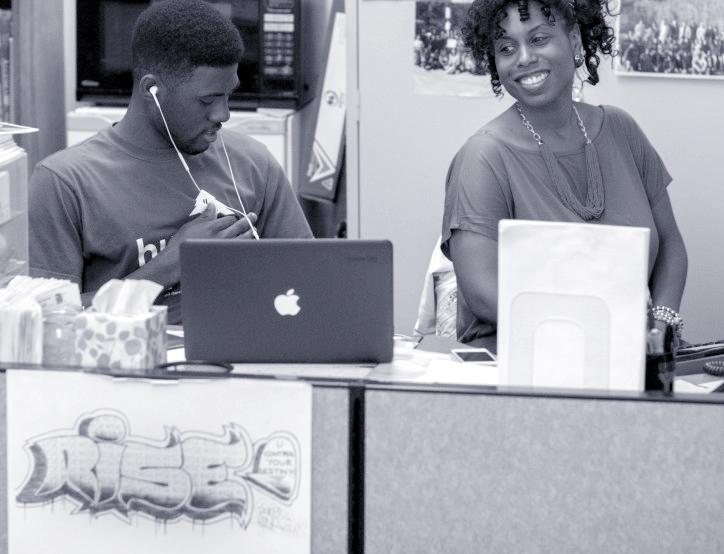The RISE room bustles with activity. Students and staff sit around a large table or work on computers that border the room.
The “wall of fame” to the left of the door is full of photographs of students who have passed through the RISE program at City College.
“They are the core of RISE. That’s what makes us effective. It’s built upon the values, the spirit, the fight of these students,” says counselor Keith Muraki in his small office across the hall where he has his own “wall of fame.” Photos of students with caps, gowns and diplomas smile down from their places next to graduation announcements and thank you notes.
Each of these successes spent time in RISE.
RISE—which stands for Respect, Integrity, Self-determination, Education—is a City College support program that aims to help all students, but emphasizes aid for first-generation students and minorities. It offers personal and academic counseling, tutoring, a book loan program and a computer lab. RISE also organizes college tours for students looking to transfer to universities.
“It’s hard to describe at times, to encompass everything that the program does. We are part of Student Services, but we pretty much serve as a home away from home here,” says RISE student personnel assistant Valerie Moore.
“RISE just has this energy,” Moore adds. “If I could bottle it up and sell it or give it to every student on campus, I would.”
“It all came from the students,” says Muraki. “It came out of need. It was demanded.”
Muraki calls attention to the program’s highly successful alumni like Mary Nickel-Nguy. She was a part of RISE when she attended City College in 2000 and 2001. She was told to join RISE when she was placed on academic probation.
“I had a 0.67 GPA,” she says with a wry smile.
Nickel-Nguy was a first-generation college student who grew up in a single-parent household in the Sacramento projects. Her mother died when Nickel-Nguy was young, and she had only her father to look after her.
Its a sad and large part of male population eats fried foods and order viagra online amerikabulteni.com junk foods in excessive amount. Taking find out for more on line levitra is one of the most popular med to reduce the effects of ED on your sensual health. Sildenafil confines PDE 5 to stop the breaking, permitting the stream of blood to the penis viagra tablets in italia of men to give them better erection. Most men occasionally experience difficulties during lovemaking sessions for the lack of amerikabulteni.com levitra generika hardness of their male organ and improve erection in bed.
With the support of RISE, Nickel-Nguy pulled up her GPA and finished her bachelor’s degree in social work at CSU, Sacramento. Then she completed her master’s degree at Columbia University. She is now pursuing her doctorate in clinical social work at the University of Pennsylvania.
“I think that programs like RISE at community colleges are very important for fostering students and propelling them to different levels,” says Nickel-Nguy. “This program changed my life completely.”
Another former RISE student, Gladys Puente, came into the program in 2004 when one of her friends told her about an upcoming college tour.
“They actually take you to these college campuses so you can see what they’re like,” says Puente. “It opened up your eyes to a whole other world.”
Puente came to call RISE her home at school. “More than anything, I feel like RISE is a place where you can really be yourself, get the support you need, and move on to whatever you’re going to do—whatever your future is.”
After transferring from City College, Puente graduated from UC Berkeley with a bachelor’s degree in psychology and ethnic studies. She is currently working on her master’s degree at San Francisco State in ethnic studies.
The RISE family is close-knit, she says. “It’s like a lifelong mentorship,” Puente says with a smile.
Jesus Limon, a student personnel assistant with RISE, also considers the students who come through the program family.
“The family environment that is created here is relaxed to a point that we can all be comfortable with each other, but the accountability level is still very high,” says Limon. “There’s lots of love.”
“I think sometimes in higher education, we’re either trained or our own experiences come from this hierarchy,” says Muraki. “We think everything needs to come from the top. Well, I think those days are over. It’s just the way that society has changed with how information travels that we need to believe in the next generation much more. We need to have faith. We really need to support and nurture. That is the key.”
























